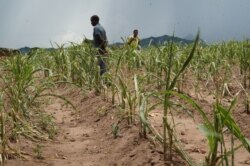Malawi’s government has put the nation on lockdown to stop the spread of the coronavirus. The virus has so far infected 16 people in the southern African country and killed two. People providing essential services will be exempt from the lockdown, but many worry the restrictions on movement and work will put many at risk for food shortages.
Enless Muheziwa has been surviving on income she gets from selling dry wood after she exhausted the two bags of maize she harvested this year from her garden.
A single mother of three children is among thousands of farmers affected by armyworms this year, in Mulanje district in southern Malawi.
She told VOA via telephone interview that although she appreciates the need to curtail the spread of the coronavirus, the lockdown seems too severe.
She said “It will be too difficult for as people in the villages to have money at once that can sustain us for three weeks. I survive on selling dry wood. So now instead of dying of the disease we will now die of hunger.”
Muheziwa suggests it would be better if government delivers food items to families in need like hers.
Announcing the nationwide lockdown Tuesday night, Health Minister Jappie Mhango said the measure is aimed to curtail the spread of COVID-19 which he said would kill about 50,000 people in the country if left uncontrolled.
“Except for enforcement officers, no person shall be allowed to leave their homes unless they are listed under Rule 11(3)(a)(i) of the Public Health Rules 2020,” he said.
Others exempted include persons delivering essential services, like food, drugs and utilities.
The lockdown also calls for the closure of all main markets across the country.
However, Mhango said communities will be allowed to sell and buy commodities at local markets and shops that will be allowed to open between 6 am and 2 pm.
Betchani Tchereni an economics lecturer at the University of Malawi views the move as a recipe for trouble.
He spoke to VOA via telephone interview.
“What we are going to see is a proliferation of many of people who ply their trades in the main markets and begin to sell them in the localities," said Tchereni. "And again there, there will be some challenges to health workers and official because now they will have to think about ‘How are we going to decongest even those places which we thought are not congested as much?”
As others worry about the lockdown, Rose Chisowa an agro-based trader in Lilongwe sees an opportunity.
Chisowa, a supplier of agricultural products across Lilongwe city, believes she will exempt from the lockdown.
She said, “Of course we will make a lot of money because many people will stop going to markets and rely on us to deliver the food items right in their homes and we will take up the risks. So it is good for us farmers.”
Heath Minister Mhango said the measures will be reviewed as the need arises.
President Peter Mutharika said the lockdown, expected to end May 9, may be extended as circumstances warrant.





